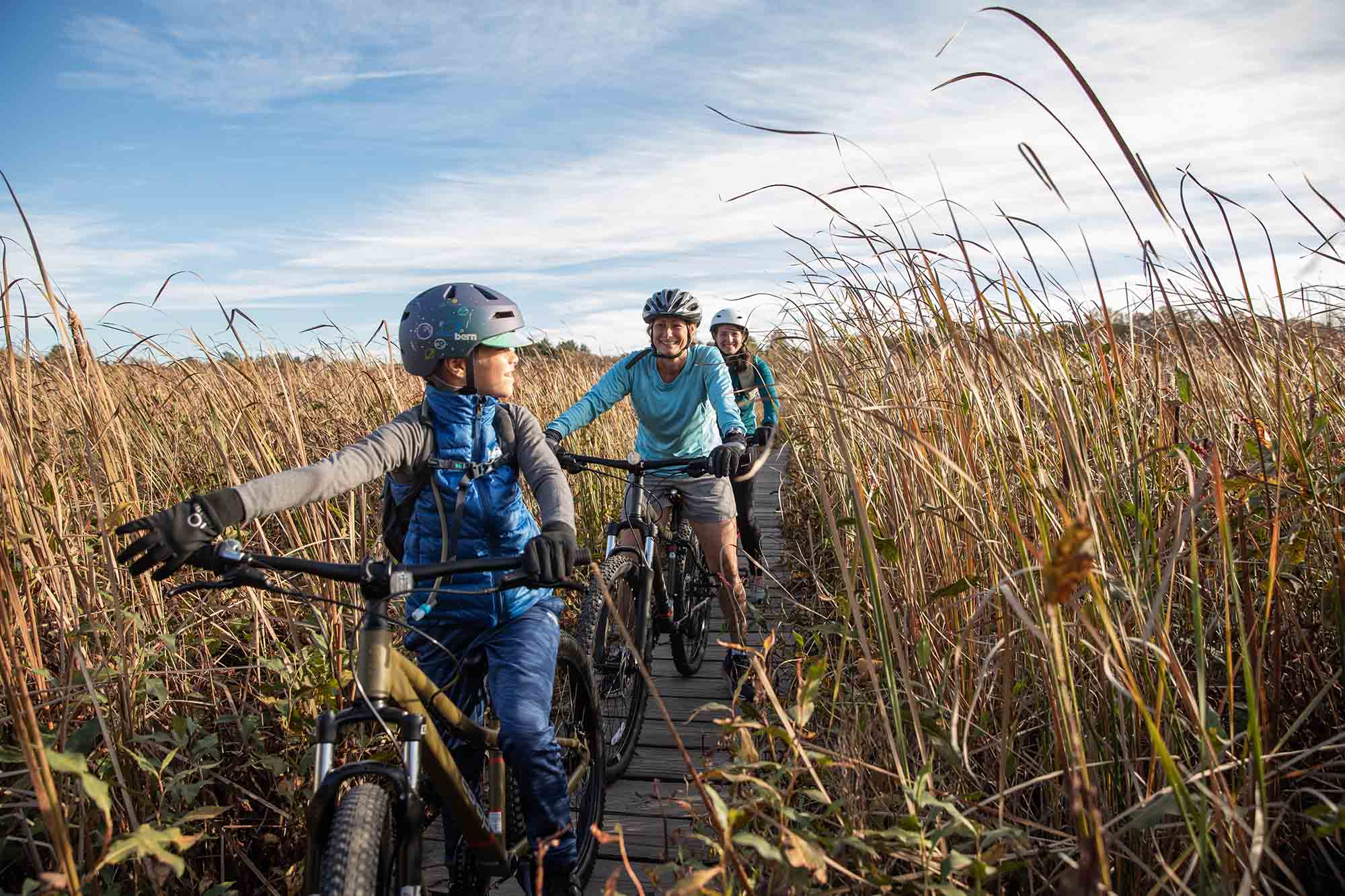Editor’s note: This story was originally published on Sept. 21, 2024, and updated on Dec. 19, 2024, to reflect the EXPLORE Act’s passage in the U.S. Senate. On January 4, 2025, President Biden signed the EXPLORE Act into law. The story has been edited to include the latest developments.
The bipartisan EXPLORE Act is one of the most consequential outdoor recreation acts proposed since 1963. It’s designed to enhance and expand outdoor recreation opportunities across the nation, from adaptive trails to long-distance biking to rock climbing and beyond.
The bill passed the House of Representatives in April 2024—with zero opposition—and passed in the Senate Dec. 19 during the post-election “lame duck” session that’s used by a sitting Congress to address urgent bills and other matters before the elected officials take office. On January 4, 2025, the EXPLORE Act was signed into law by President Joe Biden. REI Co-op—alongside the National Recreation and Park Association, PeopleForBikes, Outdoor Alliance, Access Fund, International Mountain Biking Association, Outdoor Alliance for Kids and Trust for Public Land, among others—has been a critical player in the creation of this massive policy package.
Here’s what the EXPLORE Act is, and how it will affect life outside.
What is the EXPLORE Act?
Short for “Expanding Public Lands Outdoor Recreation Experiences Act,” the EXPLORE Act is a legislative package developed in collaboration among policymakers and organizations like REI and Outdoor Alliance. Rep. Bruce Westerman (R-AR) introduced the package—which took more than a decade to draft in full—to the House in November 2023, and it passed voting in April 2024. Related initiatives can be found in similar, smaller packages like the Recreation Not Red Tape Act (which would modernize the recreational permitting process, among several other things).
EXPLORE builds on the momentum for outdoor policy, which has skyrocketed over the past 10 years thanks to increased awareness about the myriad social, emotional, mental and physical benefits of spending quality time outside.
In sum, the EXPLORE Act will improve access to our nation’s public lands and waters by:
- Streamlining the permitting process for outfitters and guides, and reducing fees for small businesses.
- Coordinating federal agencies to support and promote outdoor-based missions, from recreation to conservation and management.
- Protecting rock-climbing in some of the sports’ most iconic places and creating new long-distance bike trails.
- Addressing outdated and lacking infrastructure in gateway communities, and funding outdoor infrastructure in underserved communities.
- Improving outdoor access for current and past military service members, individuals with disabilities, and kids.
Among the more than 100 outdoor groups supporting the EXPLORE Act, REI Co-op is a key player working to ensure that policies address both outdoor enthusiasts’ and the broader community’s evolving needs. The legislative package is uniquely popular across the aisle—did we mention zero opposition in the House?—thanks in part to a 2006 economic impact study that found the outdoor industry generated more than $731 billion dollars annually. In 2024, that number is up to $1.1 trillion, and the industry supports around 5 million jobs per year.

What’s inside the EXPLORE Act—and how your voice can help
The co-op has been hard at work both in its local communities and in Washington. REI Co-op Members have sent thousands of messages of advocacy and support for the EXPLORE Act through the Cooperative Action Network, and key REI staff has worked closely with D.C. policymakers on everything from drafting language to earning passage in the House.
A first-of-its-kind recreation policy, EXPLORE comprises seven legislative packages, each set to improve a specific sector of outdoor recreation and management.
Here’s a bit about each aspect, along with how REI has played a role in shaping and supporting the package:
Outdoors For All Act: Funding new trails and green spaces in underserved communities
The Outdoors For All Act codifies the Outdoor Recreation Legacy Partnership (ORLP) program, which provides grant funding to eligible organizations in urban areas for new trails, green spaces and more—with a focus on economically disadvantaged areas. This makes ORLP permanent, changing the future of communities that need outdoor recreation most.
REI Co-op Members and employees have shown massive support for this bill, sending more than 200,000 messages to Congress as part of the Outside in 5 campaign and Cooperative Action Network initiative.
Simplifying Outdoor Access for Recreation (SOAR) Act: Modernizing permits for guides and outfitters
The SOAR Act transforms an outdated and cumbersome permitting system for guides, outfitters and recreationists. Previously, if you were traveling across land managed by different agencies or participating in more than one activity, you might need multiple permits—a significant barrier to outdoor access. Passing this bill will streamline the permitting process, increasing flexibility for guides and outfitters and removing administrative duplications (aka less work for land managers). Instead of multiple permits, you’ll need just one.
REI has been at the table on this cornerstone act for nine years, helping establish the original coalition of guides and outfitters, businesses and NGOs who worked together to form the bill.
Improving Outdoor Recreation Coordination Act: Making FICOR permanent
The Improving Outdoor Recreation Coordination Act re-establishes a Federal Interagency Council on Outdoor Recreation (FICOR). In short, FICOR is a seven-agency council dedicated to coordination and collaboration across government entities, improving access to the outdoors, and responding to emergency situations.
REI staff—including the co-op’s former head of government affairs, Taldi Harrison—worked tirelessly behind the scenes to get FICOR reestablished during the Biden Administration after the Trump Administration disbanded the council. REI Co-op leaders believe FICOR should be made a permanent entity that can transcend political differences.
Biking on Long-Distance Trails (BOLT) Act: Expanding America’s biking resources
Big news for cyclists: The BOLT Act will identify long-distance bike trails; expand mapping resources for long-distance biking; and coordinate the development, completion and promotion of in-progress trails. It requires the Agriculture and Interior Secretaries to research and identify no fewer than 10 existing long-distance bike trails, and 10 areas where opportunity exists for development. Three trails are already identified as BOLT Act beneficiaries: North Dakota’s Maah Daah Hey trail, the border-spanning Great Divide Mountain Bike Trail and Utah’s Bonneville Shoreline Trail.
REI worked with organizations like International Mountain Bicycling Association (IMBA) and Outdoor Alliance on this bill’s development and inclusion in the larger EXPLORE Act package. In total, REI Co-op Members and staff have sent close to 3,000 messages to Congress in support of this bill through the Cooperative Action Network.
Military Veterans in Parks (MVP) Act: Building adaptive trails for veterans and the broader disability community
The MVP Act spurs the building of adaptive trails, with a special focus on their use by military veterans. (Improved access for some means improved access for all.) This bill requires major federal agencies to develop adaptive trails and campgrounds to increase accessible hunting, fishing and kayaking opportunities. Veterans will also receive free recreational passes and waived fees and permit requirements.
REI worked closely with policymakers to draft the bill appropriately: Mark Berejka, REI divisional vice president of community advocacy and impact, testified before the Senate in favor of the MVP Act. The REI Co-op Member and staff community has sent over 4,000 messages to Congress supporting this initiative.
Protecting America’s Rock Climbing (PARC) Act: Standardizing recreational climbing in wilderness areas
The PARC Act directs the Agriculture and Interior Secretaries to publish guidance on recreational climbing in wilderness areas, with a focus on the use of fixed anchors and other equipment. Recent proposals to prohibit fixed anchors in wilderness areas (in the interest of conserving untouched rock faces) have threatened climbers’ access to and safety along some of the country’s most beloved routes.
Climbers are among the most active and enthusiastic members of the co-op community. To honor them, REI Co-op has invested in the Access Fund, the national advocacy organization for the climbing community, directly facilitating the group’s policy and advocacy work, resulting in this bill’s creation. The co-op has also helped draft legislative language and helped the Access Fund with administrative meetings with the Department of Interior and United States Forest Service.
Extension of Every Kid Outdoors Program (EKO): Getting more families outside
The EXPLORE Act’s passage will extend the Every Kid Outdoors Program (EKO) for seven years, providing fourth graders and their families with free access to national parks and public lands nationwide. Originally launched in 2015, the EKO has been successful but underfunded; the EXPLORE Act changes that by designating $25 million in annual funding for the program. REI was a founding member of the Outdoor Alliance for Kids (OAK), a strategic bipartisan and multi-sector network that helped with this legislative package’s creation. REI Co-op Members and staff have sent close to 2,500 messages to Congress in support of this popular bill through the Cooperative Action Network.

The EXPLORE Act Has Become Law
On January 4, 2025, President Joe Biden signed the EXPLORE Act into law.
Thanks to the REI Co-op Member community and our partners at National Recreation and Park Association, PeopleForBikes, Outdoor Alliance, Access Fund, International Mountain Biking Association, Outdoor Alliance for Kids and Trust for Public Land, among others, the EXPLORE Act is set to make history for outdoor recreation. “At the end of the year, everyone’s knocking on Congress’ door, saying, ‘We want you to do this, we want you to do that,'” says Tania Lown-Hecht, vice president of communications and strategy at Outdoor Alliance. The successful passage of this act goes to prove that as a community that’s dedicated to life outside for all, we do, indeed, go further together.
REI Cooperative Action Network
It takes less than one minute to raise your voice and help us advocate for policies that protect the outdoors, for everyone. Join the movement today with the REI Cooperative Action Network.


